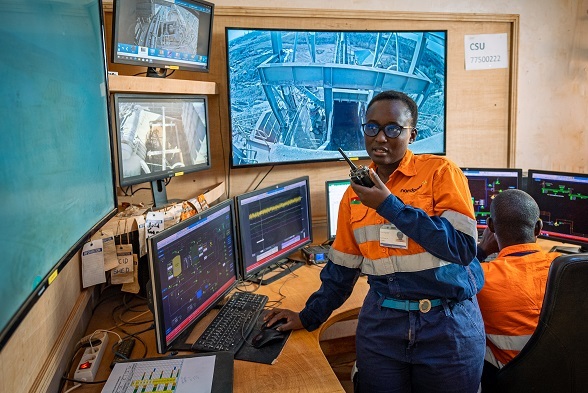
Being the world’s most successful networking company Cisco’s ubiquity is a given and it has been ‘present’ in Malta as throughout Europe and the Mediterranean area for decades through its channel partners. However its physical presence only dates from 2008, when an office was set up under its current manager Ruben Azzopardi, a man with a deep understanding of Cisco’s products and capabilities as a senior executive at one of its principal local customers. In 2011 the company was the first to move into SmartCity, a joint venture between SmartCity Dubai and the government of Malta designed to make the island a hub for ICT in the region.
That was natural enough. Located on 360,000 square metres of land in the Ricasoli area close to the capital Valetta, SmartCity Malta is destined to become a flagship development: it is a state of the art ICT township, with all the buildings knit together and managed by systems based on Cisco’s infrastructure. “We believe this is an important and strategic project for the country,” says Azzopardi. “It is going to provide a focus to develop the ICT knowledge industries generally. We felt we should be part of it!” It will help transform the country, he believes.
Cisco’s presence in Malta is helping it to develop projects that will contribute to the improvement of ICT and its application in the country, Azzopardi explains. Operationally Malta falls within Cisco’s South Region comprising Greece, Malta, Cyprus, Israel, France, Italy Portugal and Spain. Malta is clearly the smallest of these economies, but it is a country that punches above its weight in the EC and in terms of ICT it experiences no disadvantages. “We have found that having the office here allows us to be closer to our customers and to develop the sector in a more successful and satisfactory manner. We can pull in resources from different locations according to what we need here in this country.”
In that he has the support of Cisco’s Regional Sales Manager Nikos Botinis, based in Athens. “Malta is strategically a key territory that helps us to be part of the mature markets of Europe and also the developing markets in the Middle East. But Maltese companies also need to transform their business. We feel the Maltese community is ready to take advantage of those domestic businesses – some of them very successful - that are focused on the IT industry.”
Cisco’s 30-year history is a long one in ICT and the company has metamorphosed more than once. In its early years it perfected a simple architecture for ethernet switching; its second decade saw it answer the challenge of increasing bandwidth with is GSR routers; then in 2006 it launched its Human Network programme to bring it closer to the end user. Now it is anticipating the future of the internet. If we think of the growth of communications in the last 30 years as exponential, well we ain’t seen anything yet, says Botinis. Every business will be able to take advantage of what Cisco is calling the Internet of Everything. “You could call IoE the intelligent connection of people processes and things. We do feel at Cisco that this will be the trend for the next decade.” Cisco’s aim is to become the number one IT player in the world within the next three years by taking advantage, with its partners round the world, in the next major evolution of the internet.
The fundamentals support this ambition. Back in 1995 there were just a million internet-enabled connections. E-commerce, social media and the cloud, the most recent evolution, have escalated that to around three billion today, however Cisco estimates that by 2020 the number will rise to almost 50 billion. That translates into a worldwide business opportunity of $14.4 trillion, roughly 45 percent of them being machine-to-machine, or connections that take place between objects without the need for human intervention. Within that there is a large addressable segment for Cisco: “We are asking our partners to take advantage of this evolution and transform their business, whatever that may be.”
The reality is that the mobile internet is already a reality the Internet of things is only just starting, as everyday objects like medical devices learning programmes, cars, houses as well as white goods join the party that is already in full swing in industry. Cisco will be the enabler, to connect all these devices with each other and with people. Won’t Malta just be a small pawn in this massive game? No way, says Ruben Azzopardi. Everything that happens in western Europe is relevant to Malta: “The latest information from the Visual Networking Index (VNI – Cisco’s analysis of global communications networking) forecasts there are going to be 2.1 mobile connected devices per person in Europe by 2017, and this means mobile data traffic will have grown about eightfold over the five years between 2012 and 2017. That gives us an idea of where customers and users want to see better performance, and where the demand for bandwidth is coming from. We are putting in a lot of effort on our mobile providers’ behalf to help them meet the demand from their users.”
The whole point about the IoE is that it is also the Internet of Everywhere. Malta cannot afford to be insular – no pun intended – where these opportunities are concerned. So he has a multifocused strategy, part of which concentrates on Maltese businesses. “In general,” says Ruben, “Cisco is very active in the space of service providers like Melita and Go on the Malta home front, and we are doing this by delivering solutions around what we call intelligent networks. Demand on these service providers is growing daily, and to help them meet it Cisco offers software defined networks driven by Cisco’s open network environment (ONE) that takes networks into the next, more virtual, generation. “It is about making the services a telecoms company can give more relevant to the user and more attuned to give a better user experience,” he says.
The two rival networks on Malta, Go and Melita, have already benefited from this approach, Go having adopted Cisco Prime Network as a fault management tool that has reduced its infrastructure costs at the same time helping it provide a better service. And Cisco helped Melita to deploy the latest generation of cable technology enabling it to take broadband access to much higher speeds of 100 MB and above in Malta. Melita was one of the first companies in Europe to roll this out on a countrywide basis and the project has become a benchmark for customers in other territories, he proclaims.
His job is to introduce leading edge technologies and stay ahead of the evolution defined by IoE and technologies like ONE. A solid ICT infrastructure can support the economy directly and indirectly, he stresses: ICT is basically a supporting infrastructure. It creates high value jobs as well. Malta has been at a very good level when it comes to adoption and introduction of technology at various levels so I think having a healthy ICT industry and infrastructure helps other parts of the economy. Moreover we are making sure that we have certified specialised and trained people to support the business here in Malta and by transference to neighbours in Europe, North Africa and the Middle East.”
Nikos Botinis agrees: “Each country has to decide on the strategic advantages and the strategic areas it has within the EU. And then the ICT comes in as an enabler to multiply the effect on the strategy that has been decided on a country level. I would say that this is our role at Cisco, to add value and catalyse this multiplier effect. We started in Malta with one partner and two or three resellers and we now have 25 authorised resellers and we have more than 50 Cisco engineers. Is this adequate? No, to be honest, but we feel Malta is on the right track with the adoption of programs like the Cisco Network Academy Program where we jointly develop engineers in the local market.”
Another area of focus for Cisco is the cloud and the growth of software as a service (SaaS) and for Cisco’s direct partners infrastructure as a service (IaaS). Cisco is leading the way with newly announced tools. “We have created an infrastructure platform for our customers to be able to go on the application layer because this is the fundamental part,” says Azzopardi. A key element within ONE is a programme development kit (onePK) that allows application providers to create ‘hooks’ or new applications relating to the network. “It is a more ‘standard’ way of interacting with the network, he explains. “It is still cumbersome to interact with a network device and you need very specific technical knowledge of how that device works. With onePK it is easier for developers to actually talk to the network and ask it to do things or ask it to give information back.”
As the internet grew it became complex. The task now is to simplify it again and return the benefits of flexibility and ease of use to application developers. “But this also gives an opportunity to the local developers to think about what they can do to simplify the experience for their users,” says Nikos Botinis. “The network touches everything!” Malta intends to be right in there, promises Ruben Azzopardi. “We are saying to the Maltese companies: ‘You have a vehicle. The government is investing in creating an environment in SmartCity to develop technologies relevant all over the world, not just Europe. What you can develop here can be marketed all over the world.’ We are giving them the tools, the platforms and the development kits to take their ideas and their abilities to that market.”
Written by John O’Hanlon, research by James Boyle
DOWNLOAD
 Cisco-Euro-Telcoms-Aug13-Bro-s_0.pdf
Cisco-Euro-Telcoms-Aug13-Bro-s_0.pdf













